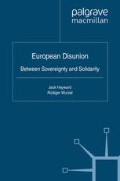Abstract
National parliaments are often seen as the victims of European integration. While closer integration in the European Union (EU) has led to an increased role of the European Parliament (EP), national parliaments have seen their powers curtailed. According to the so-called deparliamentarisation thesis, EU integration has led to the erosion of national parliamentary control over their national governments. The marginalisation of national parliaments in EU decision-making is linked to three issues: reduced national policy autonomy, a shift in the domestic executive-legislative balance, and information asymmetries (Jans and Piedrafita 2009).
Access this chapter
Tax calculation will be finalised at checkout
Purchases are for personal use only
Preview
Unable to display preview. Download preview PDF.
Bibliography
Blomgren, M. (2003), Cross-Pressure and Political Representation in Europe. A Comparative Study of MEPs and the Intra -party Arena (Umeå: Umeå University).
Bengtson, C. (2007) ‘Interparliamentary cooperation within Europe’, in J. O’Brennan, and T. Raunio (eds). National Parliaments within the Enlarged European Union. From ‘Victims’ of Integration to Competitive Actors? (Abingdon: Routledge), pp. 46–65.
Born, H. and H. Hänggi (2004) The ‘Double Democratic Deficit’: Parliamentary Accountability and the Use of Force Under International Auspices (Aldershot: Ashgate).
COSAC (2011) 16th bi-annual report: developments in European Union procedures and practices relevant to parliamentary scrutiny. COSAC Secretariat, October 2011.
European Commission (2005) The Commission’s Contribution to the Period of Reflection and Beyond: Plan-D for Democracy, Dialogue and Debate, Communication from the Commission to the Council, the European Parliament, the European Economic and Social Committee and the Committee of the Regions, October 13, COM(2005) 494 final (Brussels: European Commission).
Goetz, K.H. and J.-H. Meyer-Sahling (2008) ‘The Europeanisation of National Political Systems: Parliaments and Executives’, Living Reviews in European Governance, 3(2) (www.livingreviews.org/lreg-2008–2, 2008).
Hix, S. and B. Høyland (2011) The Political System of the European Union, 3rd ed. (London: Palgrave).
Hix, S and T. Raunio (2000) ‘Backbenchers Learn to Fight Back: European Integration and Parliamentary Government’, West European Politics 23 (4), 142–168.
House of Commons Information Office (2010), EU Legislation and Scrutiny Procedures, Factsheet 11, September 2010 (London: House of Commons).
Jans, T. and S. Piedrafita (2009) The Role of National Parliaments in European Decision-Making, EIPASCOPE 2009/1 working paper.
Judge, D. (1995), ‘The Failure of National Parliaments’, West European Politics, 18 (3), pp. 79–100.
Majone G. (2000) ‘The Credibility Crisis of Community Regulation’, Journal of Common Market Studies, 38 (2), 273–302.
Maurer, A. and W. Wessels (eds) (2001) National Parliaments on their Ways to Europe: Losers or Latecomers (Cambridge: Cambridge University Press).
Moravcsik, A. (2002) ‘In Defense of the “Democratic Deficit”: Reassessing the Legitimacy of the European Union’, Journal of Common Market Studies, 40 (4), 603–34.
O’Brennan, J. and T. Raunio (2007) ‘Deparliamentarization and European integration’, in J. O’Brennan and T. Raunio (eds). National Parliaments within the Enlarged European Union. From ‘Victims’ of Integration to Competitive Actors? (Abingdon: Routledge), pp. 1–26.
Rasmussen, M. (2008), ‘Another Side of the Story–a Qualitative Case Study of How MEPs Vote’ Politics, 28 (1), 11–18.
Raunio, T. (2005) ‘Holding Governments Accountable in European Affairs: Explaining Cross-National Variation’, Journal of Legislative Studies, 11 (34), 319–342.
Raunio, T. (2009) ‘National parliaments and European integration: what we know and what we should know’, Arena Working Paper No. 2, January 2009.
Rideau, J. (1996) ‘National Parliaments and the European Parliament —Cooperation of Conflict’, in E. Smith (ed.) National Parliaments as Cornerstones of European Integration (Dordrecht: Kluwer Law International), pp. 173–178.
Smith, E. (1996) ‘Introduction: ‘Sovereignty’—National and Popular’, in E. Smith (eds.) National Parliaments as Cornerstones of European Integration (Dordrecht: Kluwer Law International), pp. 3–18.
Sørensen, C. (2008) ‘Love me, love me not… A typology of public euroscepticism’, EPERN Working Paper No 19, Sussex European Institute.
Editor information
Editors and Affiliations
Copyright information
© 2012 Maja Kluger Rasmussen
About this chapter
Cite this chapter
Rasmussen, M.K. (2012). The Empowerment of Parliaments in EU Integration: Victims or Victors?. In: Hayward, J., Wurzel, R. (eds) European Disunion. Palgrave Studies in European Union Politics. Palgrave Macmillan, London. https://doi.org/10.1057/9781137271358_8
Download citation
DOI: https://doi.org/10.1057/9781137271358_8
Publisher Name: Palgrave Macmillan, London
Print ISBN: 978-1-349-34969-2
Online ISBN: 978-1-137-27135-8
eBook Packages: Palgrave Political & Intern. Studies CollectionPolitical Science and International Studies (R0)

